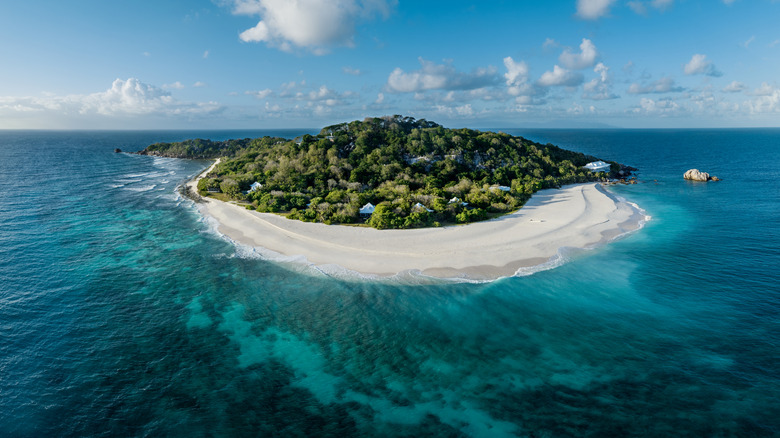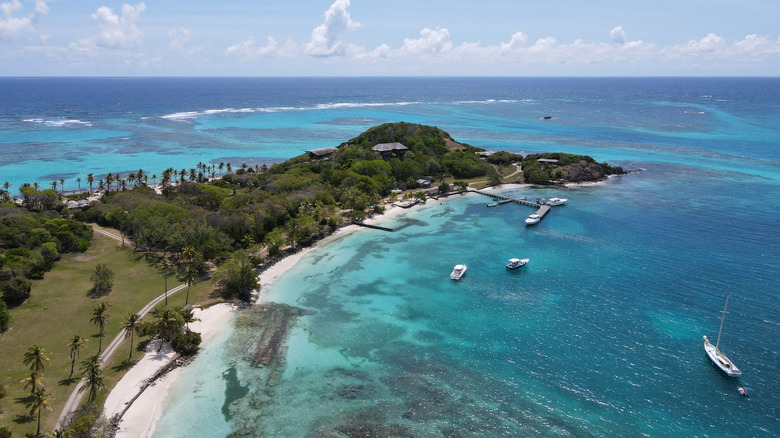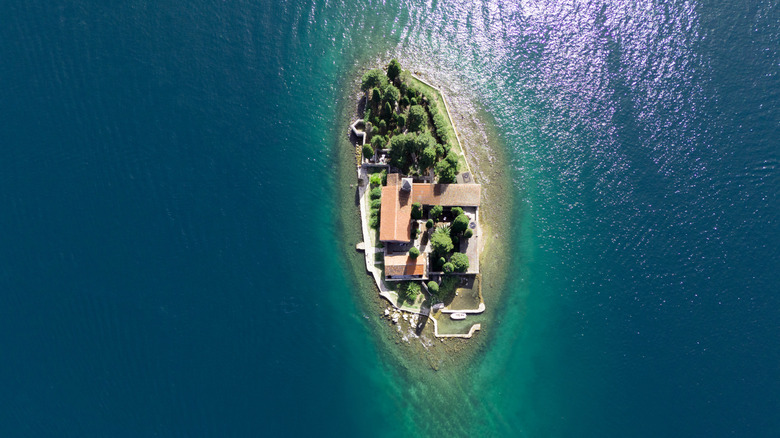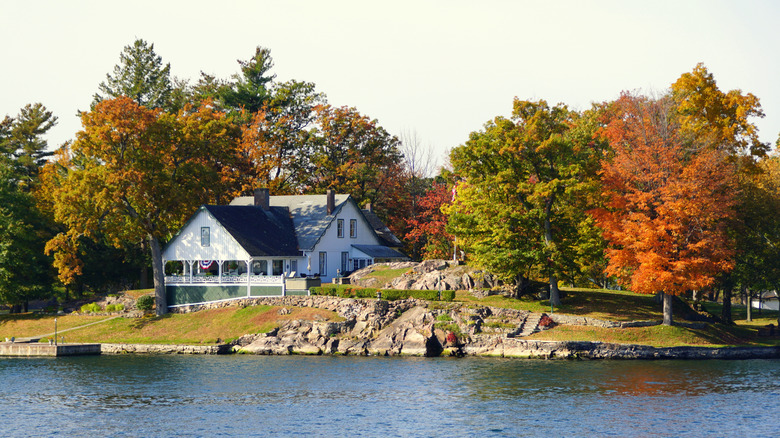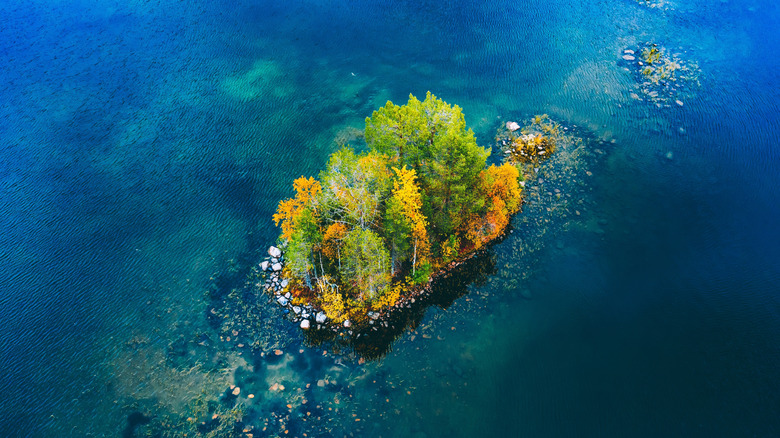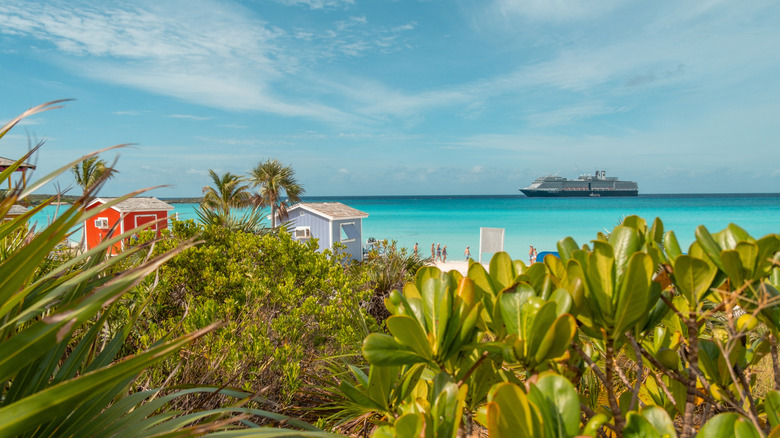What It's Really Like To Own A Private Island, According To People Who Did It
Nothing says "luxury" like a private island. Exclusivity, privacy, and top-tier vacation vibes are sought after by elites, romantics, and villains alike. Some of the most public-facing celebrities known to own private islands include Beyoncé and Jay-Z, Steven Spielberg, Nicolas Cage, and Leonardo DiCaprio. DiCaprio has spent a decade trying to build a luxury eco-resort on his island, Blackadore Caye in Belize, and Cage sold his Bahamian island in the Exumas after it turned out to be home to a rare iguana species (it sold in 2023 to Gunther, the world's richest dog). Out of the estimated thousands (or millions, depending on how you define "island") across the globe, there are more privately-owned islands than you might expect — and they're not all in the hands of billionaires. Yes, even a (very wealthy) canine can own an island. Cruise lines own private islands, too. But before you go feeling sorry for yourself, take heart: Owning a private island might not be as out of reach as you might think. Ordinary people are redefining what "island life" can be.
Take, for example, Canadian couple Virginie Lévesque and Eric Thériault. In 2019, a lighthearted question, "If you had to live on a deserted island, what's the one thing you must absolutely have?" sparked a real-life dream. In 2021, after island shopping and COVID-19 delays, they found their dream space, purchasing a 2-acre island in Bocas del Toro, a Panamanian archipelago in the Caribbean, for an undisclosed amount. They imported treated wood, tools, and supplies — even a Tritoon pontoon– and camped while they built a solar-powered, open-concept house facing the clear-blue Caribbean. Health issues prompted the couple to list their island for sale in 2025, now acquirable for roughly $12,000 in concessions plus additional expenses — and the pontoon's included.
Everything has to be shipped in
On Reddit, a thread sparked interest about the realities of private island ownership after one user wrote: "My family owned a private island — AMA [ask me anything]." The poster explained that their aunt and uncle had owned a private island and resort in the Grenadines, an island chain in the Caribbean south of the Bahamas, which they grew up visiting. Although the family sold the 22-cottage property after 45 years, Petit St. Vincent remains an exclusive resort popular for honeymoons and is still privately owned today.
Throughout the thread, the poster answered questions and shared stories about private islands. Though unsure of what the uncle originally paid for the island in the 1960s, it likely wasn't much and was probably paid directly to the government. The area was remote and underdeveloped at the time — many nearby islands didn't even have electricity or running water. "All of the cottages on the island were built with stones that were quarried and mined on the island by local labor," they wrote. "The wood was brought in on barges from the island of St. Vincent. When building on a small island it is absolutely crucial to use as much local resources because everything that you need (I mean EVERYTHING from toothbrushes to toilet paper) has to be shipped in via large containers that only arrive once per month and are very expensive to ship."
The thread also discussed commuting by boat, desalinating water to make it potable, smuggling fuel from South America to run the resort's generator and avoid high St. Vincent taxes, and the island's notable guests over the years — many by yacht — including Tony Blair, Daniel Craig, Kelly Ripa, and "Sports Illustrated" models who used the island for a photoshoot.
How a crowdfunded island became its own micronation
As the Independent explained, in 2018, Gareth Johnson, founder of adventure travel company Young Pioneers, decided to turn a half-joking idea into reality. His plan was to find people to crowdfund the purchase of an island, then build infrastructure to create their own micronation, and maybe turn a profit. He found some like-minded friends, and they scouted from the Philippines to Ireland before settling on Coffee Caye, a 1.2-acre, bean-shaped island off the coast of Belize City. Through a website called LetsBuyAnIsland, they recruited additional investors and purchased Coffee Caye in 2019 for $180,000. Thus, The Principality of Islandia was born, complete with a flag, national anthems, passports, and self-proclaimed diplomatic titles.
This isn't the first attempt to create a micro-autonomous nation, but it is an imaginative social and financial experiment. "Stepping onto an island that you've invested in, and own, that's an amazing feeling," said Marshall Mayer, co-founder of The Principality of Islandia, in a CNN interview. By 2022, the group began running tours to the island, and while it remains uninhabited, the island is now part of Young Pioneers tours and available for camping. Of course, the prime minister of Belize dismissed the micronation, calling it "stupid," and the minister of foreign affairs emphasized that Belize would continue to retain jurisdiction over Coffee Caye (via The Independent).
For Stephen Rice, one of the original investors, that's fine. Rice admits island ownership won't make him rich, but the price of his share — and the travel it takes to get there — is worth the fun of telling his friends he owns an island. "You might think I'm trying to sell you a timeshare," he explains, "but I'm the one paying to be here on my own island." The Principality of Islandia's spirit thrives on.
Tropical islands make sense, but what about northern ones?
Islands exist at every latitude, and northern ones are said to be cheaper and more convenient. A friend group in Nova Scotia, Canada, pooled resources to buy an undeveloped island for under $10,000, close enough to the mainland for cell service and quick weekend trips. "It's perfect for 3 months of summer, it's quite nice for 3 surrounding months," said one owner. "So, we get 3-6 months of great, longggg-day summers."
On the public forum Quora, user Mary Gordon shared what it's like to own a 1.5-acre island on a lake in Ontario, complete with a modest summer cottage. According to Gordon, the biggest drawback is not being able to use the cottage year-round. The plumbing relies on the lake, which freezes during the cold Canadian winters, so every November, they drain their pipes and pack everything away to prevent bursts. Fortunately, the island has electricity and a landline, installed back in the 1970s, when it was free. Today, she says, that would cost a fortune. Gordon's island sits close to the mainland, where she owns an access road, a parking area, and a dock, making supply runs much easier than in the Grenadines or Panama, though transporting things can still require effort. With only an aluminum rowboat, she's hauled appliances, lumber, a new steel roof, mattresses, and garbage. "You need anything fixed beyond DIY, you have to go get the tradesperson and all their stuff," she said.
Despite the challenges, for Gordon, a private island isn't about luxury, isolation, or beaches — it's about tranquility, connection, and tradition. "I love it," she said. "Love the privacy and the critters. Now that I'm retired, I'm here 5 or 6 months of the year. My children grew up here. We do Canadian Thanksgiving here."
Building from scratch is slow work when you can only access your island for part of the year
Students and romantic partners Oliver and Helena bought a fully undeveloped, 2.5-acre forested island in Finland in 2024, with plans to transform it into a summer retreat complete with a log cabin, sauna, and floating dock. The couple is entirely self-sufficient and self-taught — neither has any hard-skill experience typically needed for such a project, like carpentry or construction. The island cost them 28,000 euros, which Oliver says is a fair investment (via YouTube). In their first two seasons, they managed to make surprising progress despite the limited access; they could only work on the island during the warmer months.
With no electricity, plumbing, or prior development, they began by clearing trees and building a wooden platform and a base camp in July 2024. By the end of summer 2025, they had completed a tiny log cabin and imported 13,000 pounds of concrete, along with a mixer, to begin constructing their full-sized log cabin, designed to Finnish code with the help of local architects. Despite its remoteness, the island is still subject to zoning regulations. The Finnish government has designated only the western half for residential development, adding yet another layer of complexity, and a reminder that even the most isolated properties and lonely islands come with rules. If this piqued your curiosity, check out Finland's largest lake, brimming with islands and pristine nature.
What to know when buying a private island
One of the biggest challenges of island life is accessibility. Islands are, well, just that: surrounded by water, often remote, rarely close to any airspace or urban center where goods and services are readily available (remember "Cast Away"?). Those who buy small, undeveloped islands often face the daunting task of importing every material needed for even the smallest projects. "Most people who want an island are avid boaters," says Chris Krolow, CEO of Toronto-based brokerage Private Islands, per NPR. But even if you love boats, where will you be boating in from? Is that launch point accessible year-round? For instance, Petit St. Vincent's closest airport is on tiny Union Island, a 15-minute boat ride away, and flights to Union Island are limited.
How developed the island already is will also influence its price, and its long-term viability depends on local and environmental restrictions within the country it belongs to. In the case of the Canadian couple who moved to Bocas del Toro, the price was right, but much more investment was needed to ship supplies, build a home, and work with government and environmental mandates (you can't just declare your micronation and call it a day!).
Accessibility also affects costs: usually, the more remote the land, the cheaper it is, but the higher the expense of building and maintenance. Infrastructure, transport, and security can add up. Squatters are another consideration, and a private island can be more challenging to secure, especially if you're not working with Larry Ellison-level resources. Financing is said to get complicated while navigating foreign tax laws, too, so thorough research and hiring local experts is essential. Owning a private island can be the ultimate escape, once you face the logistical realities. It's all part of the adventure — do it for the plot!
